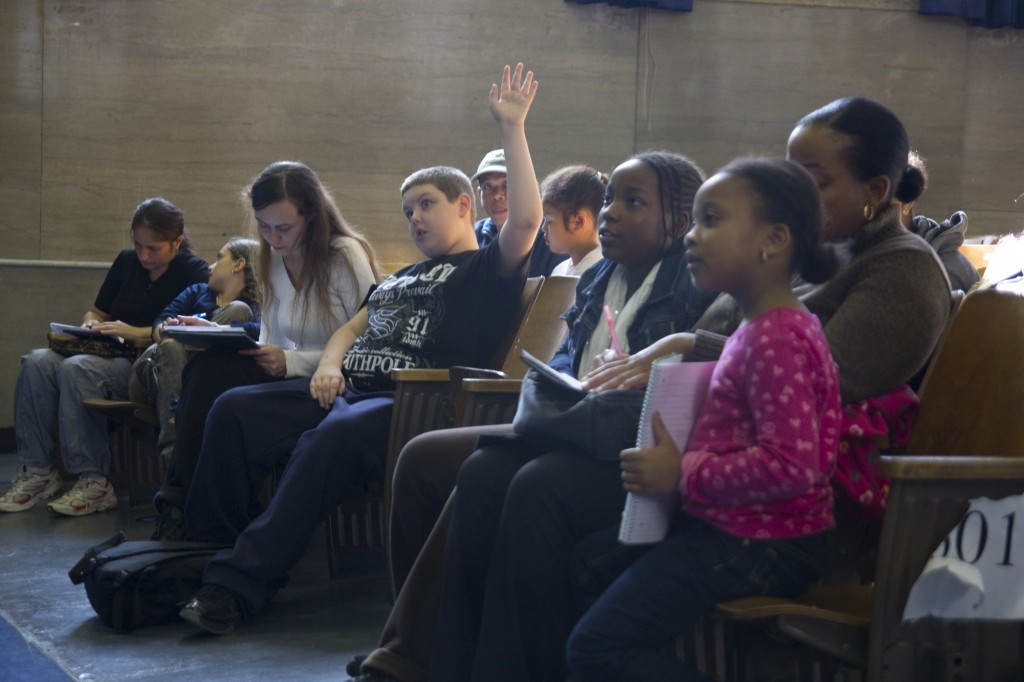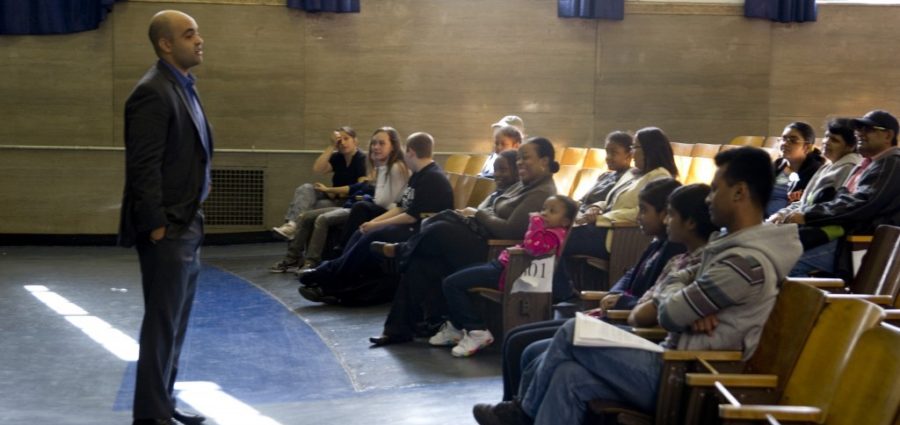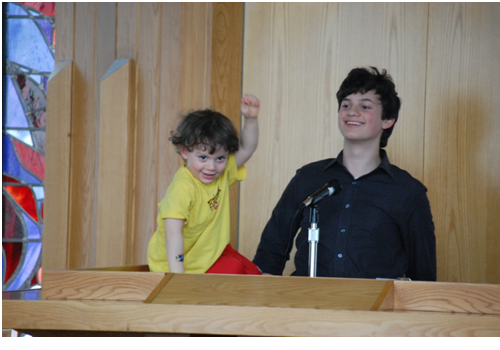Benedit Medina, a shy but determined 11-year-old student in the Bronx, wants to be a detective when she grows up, just like the ones she sees on the crime television show “C.S.I.” To help achieve her dream, the sixth grade student at M.S. 80 on Mosholu Parkway in Norwood hopes to attend the Bronx High School of Science, one of New York City’s top high schools.

“Science is the number one thing that they study,” Benedit explained, while her mother, Natalia Gonzalez, nodded vigorously beside her.
However, precedent is not exactly on Benedit’s side. School administrators said not a single student from M.S. 80 last year was accepted to any of the city’s eight elite high schools, public schools that selectively admit grade eight applicants based on their scores on the Specialized High School Admissions Test. According to the Bronx Borough President’s office, barely 6 percent of Bronx students last year were among the nearly 6,000 students across the city accepted into any of these specialized high schools, including the Bronx High School of Science in Bedford Park.
That is why Benedit and her mother were among the two dozen parents and students gathered inside the auditorium at M.S. 80 last Saturday morning, to learn more about the start of a new tutoring program aimed at preparing students for the specialized exam.
Beginning October 22, 2011, M.S. 80 will become the Bronx pilot site for the Science Schools Initiative, a Washington Heights-based tutoring service that provides free preparation for the exam to low-income students. The founders said the program, which will run Saturday mornings for about 60 students at the school, will help level the playing field for families who cannot afford pricey test preparation programs.
“We are trying to get kids who have the ability to get into these schools, but can’t afford expensive test preparation,” said Mike Mascetti, 27, co-founder of the Science Schools Initiative and a graduate of Stuyvesant High School. “It’s almost impossible to get into these schools and not have taken a test preparation program.”
The eight specialized high schools in the city, which include top-ranked schools like the Bronx High School of Science, Brooklyn Technical High School and Stuyvesant High School in lower Manhattan, admit only a handful of the nearly 28,000 eighth-grade students who write the specialized exam every year. The schools are largely seen as a gateway to prestigious colleges across the country, yet Bronx students, along with low-income black and Hispanic students, fare poorly every year. According to city data compiled by GothamSchools.org, Hispanic and black students made up just 11 percent of those admitted to the specialized high schools for the 2011-2012 academic year, a number that has been steadily decreasing.
Mascetti, a Queens native, along with fellow Stuyvesant graduate Darren Guez, started the program in 2007 after realizing that many low-income students could not afford enrolling in private test preparation programs, which can cost hundreds of dollars.
“We were thinking maybe we should tutor people who are a little more like us, from low-income or middle-income backgrounds, who can’t afford test preparation. Going to Stuyvesant was a transformative experience for me. There is not any question you are going to graduate, unlike at the other schools.” said Mascetti, a law student at City University of New York.
Using donated classroom space at Columbia University’s medical school in Washington Heights, the program has so far helped 40 students gain entrance to a specialized high school, about a 50 percent success rate.
Mascetti said that they were looking to expand the program to other parts of the city earlier this year when a frustrated Bronx resident came knocking on their doors, angered by fact that Bronx students had a poor showing among the city’s most elite schools.
“The schools are rated the worst in the Bronx,” said Adaline Walker-Santiago, a former administrator in the city’s education department and chair of the long-term planning committee for Community Board 7. “These kids are just as smart as any kid in the city, but they are just not given the same opportunity for a good preparatory class.”
After finding out about the Science Schools Initiative online, Walker-Santiago arranged a meeting with Mascetti and several middle school principals in the Bronx. It was decided in late spring that M.S. 80 would be the pilot site for the program, a school known for its poor test scores and high number of disabled and English-language learners. Two weeks ago, the city’s education department selected M.S. 80 for up to $2 million in federal funds from the U.S. Department of Education to help turn around its poor performance. A portion of the funds is being directed towards launching the Science Schools Initiative, said school administrators.
“We’re very excited,” said Lovey Mazique-Rivera, principal of M.S. 80. “The parents love it. They are really appreciative the school is offering this service to them.”
About 60 sixth and seventh grade students at M.S. 80 were selected for the program based on their eligibility for free school lunch, and their performance on a mock selective exam that Mascetti and his team administered at the end of June. Both Mascetti and school administrators hope that 50 percent of them will eventually gain entrance to one of the city’s specialized high schools.
Inside M.S. 80’s auditorium, parents and students listened raptly to organizers of the Science Schools Initiative as they described the potential life-changing value, and rigorousness, of the program.
“We’re here to teach you how to take the test,” said co-founder Darren Guez, addressing some of the nervous looking students. “Every one of you here is smart enough to go to the Bronx High School of Science, as long as you put in the effort.”
For Juan Ynfante, who attended the meeting with her 12-year-old daughter Jaylene, the program is a chance not only to attend a better high school, but a chance for a better life.
“It gives a better opportunity to go to a good college,” said Ynfante, speaking through a Spanish translator. “I want her to do what I couldn’t do.”
For Walker-Santiago, the Bronx resident that brought the program to the borough, increasing the Bronx presence at specialized high schools is really a chance to improve the long-term prospect of the community.
“They are the future Robin Hoods of education,” she explained, referring to the preteens starting the program. “When they are making six figures, they will come back and give to the community.”








